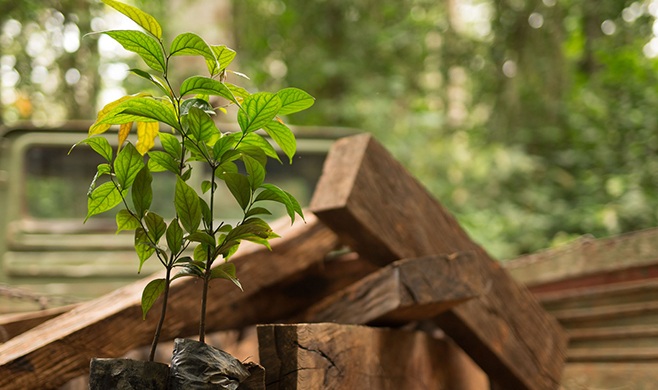Rainforests have long been recognized for their importance to the entire planet. They absorb carbon dioxide and release oxygen, something all animals need to survive. They are also home to some of the most biodiverse ecosystems on the planet, boasting a vast array of plants and animals, many of which are still undiscovered by humans. However, these ecosystems are being decimated by human activity today; some people log trees specifically for their wood, while others clear-cut forests for other activities like agriculture, demolishing this amazing resource. Most rainforests recover very slowly from these human activities, and some never recover at all.
However, this tragic loss of the world’s rainforests is entirely preventable and reversible, and this is what we are working to achieve here at UCLA. Throughout the year, our team will be researching ways to use rainforests sustainably — so that they will be around for centuries to come. Specifically, we will be focusing on ebony trees in the Congo Basin. Ebony is a unique hardwood tree found in the rainforests of Africa that has many uses for humans, like instrument making; thus the target of some very unsustainable methods of harvesting and processing.
We are partnering with UCLA affiliates like the Congo Basin Institute and external companies like Taylor Guitars to develop a model for sustainable ebony farming and production in Cameroon. In order to do this, we are gathering and analyzing data about how ebony grows, what role it plays in the ecosystem, the global demands for its wood, and its value to local communities. Before drawing any conclusions, It is critical to understand the importance of ebony in ecological, political, and economic contexts, on both a local and global scale. It is also crucial to involve the local communities in the data gathering and decision making. After all, they are the ones directly impacted by ebony production and many of their livelihoods depend on it.
With this information, we will build a holistic, integrative model for sustainable agroforestry in the region. In other words, we will create a system of producing ebony which maintains harmony with the natural ecosystem and which meets the needs of the indigenous people. This project will give us a better understanding of the complexities of rainforest ecosystems and help improve forest management in the future.
Team: Victor Takasu, Benjamin Negose, Chloe Whicker, Courtney Horn, Enikoe Bihari, Evelin Escobedo
Advisors: Kevin Njabo and Noah Garrison
Client: Taylor Guitars

Top image via taylorguitars.com.
Related Publications

